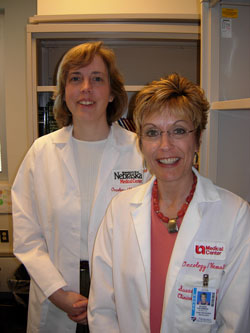 |
From left: Deborah Darrington, M.D., and nurse Susan Daubman are leading two UNMC-sponsored clinics at Clarkson West Medical Center that cater to the needs of those who have survived cancer treatment. |
The Comprehensive Assessment Clinic and the Internal Medicine Clinic for Cancer Survivors deal with ongoing physical and psychosocial needs of those who’ve completed cancer treatment. The clinics — sponsored by UNMC and its hospital partner, The Nebraska Medical Center — will be at Clarkson West Medical Center, 144th St. and West Center Road.
“Some people feel lost after treatment,” said Deborah Darrington, M.D., UNMC assistant professor of internal medicine and medical director of the clinics. “Our goal is to help the patient transition from cancer treatment to recovery. The clinic is an opportunity for cancer survivors to be evaluated by a multidisciplinary team of health professionals in one day. We will be providing patient education, answering questions and giving survivors resources for future reference.”
The Comprehensive Assessment Clinic, which was designed based on information garnered from patient feedback, is available every Monday morning.
During a half-day visit, patients receive a complete history and physical and are assessed by a team of health professionals. Patients also receive education on a variety of topics including how to lead a healthy lifestyle.
Though the clinic currently only serves breast cancer patients who’ve finished treatment, it eventually will expand to include lymphoma patients and other cancer survivors. In the weeks following their visit, patients will receive a cancer survivor plan of care including a summary of the team’s recommendations to address health care maintenance issues. The plan of care will be provided to the patients, their oncologists and their primary care physicians to facilitate communication for follow-up care.
The Internal Medicine Clinic for Cancer Survivors is currently available to all cancer survivors to provide general internal medicine care including management of high blood pressure, high cholesterol, acute illnesses such as colds and infections, physical exams and adult immunizations. This clinic is available Monday afternoons, Wednesdays and Fridays.
Susan Daubman, who has been an oncology nurse at The Nebraska Medical Center for 25 years, is case manager for the clinics. She said patients who’ve finished treatment often mention how cancer diagnosis and treatment consumed their thoughts, and it isn’t until after completion of their therapy that they begin to think about their general health.
“They’ve made it through their chemotherapy and/or radiation and suddenly there exists a feeling of ‘now what?’ We feel the survivorship clinics will provide patients with guidance and direction for their future follow up care needs,” Daubman said. “The main goal is to promote and foster an overall healthy life style for the future.”
|
|
Hassler asked to be referred to the internal medicine clinic to find a doctor who could coordinate visits with other physicians she was seeing and to monitor her needs for tests and screenings.
“There’s a huge population of cancer survivors who have ongoing health care needs that others in the population don’t have,” Hassler said. “It’s very important to me, especially when there are other medical conditions that arise as a result of treatment.”
She sees the clinic as a “prescription” for cancer survivorship. She said it’s important to her to see a specialist familiar with the needs of cancer survivors.
“There are a lot of things we go through,” Hassler said. “Having cancer treatment completely changes the way you have to manage your health. It’s much more involved than just eating properly and getting enough exercise. There are a lot of things that can crop up later down the road because of the treatment. The clinic is exciting.”
Susan Barnes, 49, sought out the comprehensive assessment clinic after she’d finished breast cancer treatment and surgery.
“You’re so busy when you’re going through cancer treatment, and then you’re on your own. It was kind of like ‘What do I do now? What should I be looking for and to whom should I go to ask questions?'” Barnes said. “I wanted to talk with someone who would understand the nervousness of being done with treatment. The clinic reassured me that I’m doing the right thing and it gave me someone to talk to.”
For more information about the new clinics, call 778-5580.